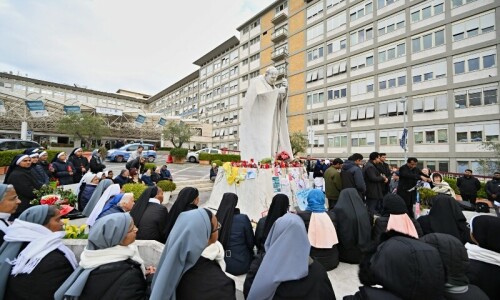QALAT (Afghanistan): Row upon row of saplings stand in the sun in the capital of Afghanistan’s drought-hit Zabul province where war and poverty have left ancient underground irrigation channels dry and the hills bare.
These young plants have been weeded and watered and brought to life in this tough terrain by some of the poorest women of Qalat who are reaching for more in a harsh world — at risk to their personal safety.
Almonds and apricots, cedar and cypress, pine and pistachio: a lot rides on these 203,720 saplings.
The 90 women who raise them are paid with 61 kilogrammes of oil, wheat, pulses and salt a month as a part of a “food for work” programme on which many Qalat families depend.
Their labour also earns them lessons in reading and writing, nutrition and healthcare – for some the first schooling in their lives.
When the saplings are ready for planting, half will go to adopt-a-tree and other projects to re-green this barren-looking land, perhaps helping to re-establish the almond orchards that are the pride of Zabul.
The rest will go to the women to seed small businesses selling the trees or their harvest, or just to provide their families with fruit and nuts.
Inside a new building under the nursery’s scraggly pines, row upon row of women sit on the floor, facing a teacher.
Many have pulled their blue burqas back over their faces because there are visitors. Hands and feet are red with henna; children fidget as their mothers recite phrases written on the board.
It has been a struggle to get these women here. Zabul, like all of southern Afghanistan, is deeply conservative and influenced by the extremist Taliban religious movement, whose insurgency keeps the nation unstable.
“Women of child-bearing age are not allowed to go outside the home, only very old women and widows can have some activity,” says the province’s top women’s affairs official, Gulnar Rashidi.
“If men are willing to let women have social activity, other men criticise them,” Rashidi says.
“Sometimes we get threats in the mosque or from men on motorbikes who ride past. We feel worried. If the door opens, we worry,” says Nasreen, who wears a large black shawl.
Nasreen supervises 80 home-based nurseries run by women who cannot leave their houses because they must care for their children – or because their husbands will not allow them.
As the project – part of the UN-backed Green Afghanistan Initiative (GAIN) – comes into fruition with the first trees ready for planting next month, its funding dries up in June.—AFP















































